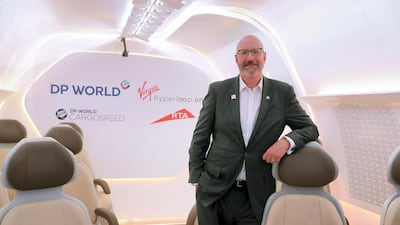A company developing a version of the futuristic Hyperloop transport system has declared that it is “ready to go” - with construction of a track in India to begin as early as next year.
Jay Walder, the chief executive of Virgin Hyperloop One, said during the World Energy Congress in Abu Dhabi that the five-year-old company had learned lessons from almost 500 journeys conducted on a test track in Nevada, where it had hit speeds of almost 400 kilometres per hour, proving that the technology works.
It is envisaged that the company’s full version of Hyperloop, which involves a pod travelling through a vacuum tube, will be able to reach speeds of 1,080kmph.
It could potentially mean a journey between Abu Dhabi and Dubai would take just 12 minutes and a trip between the UAE capital and Riyadh could be made in about 48 minutes.
“My whole background is running large-scale transport systems,” said Mr Walder, who has previously had high-profile roles managing public transport in London, New York and Hong Kong.
"The point of my being here is we are at the place where we should, and want to, and are ready, to deliver real projects now.
“We’re completely confident on the technology. We’re continuing to innovate our technology but we’re innovating off of something that works… we’re ready to go.”
Several companies and universities are now working on Hyperloop systems, with the idea first floated by Tesla’s Elon Musk in 2013.
Giving an update on his company’s plans at the congress, where a full-size model of a section of Hyperloop pod has been set up for delegates to inspect, Mr Walder said work would soon begin on a 12km stretch of track in India which would allow regulators to approve the new technology.
It is part of a wide-ranging project aiming to create a 150km track linking Mumbai and Pune, meaning a journey that takes three hours by car could be completed in 25 minutes. Among the visitors to the model pod this week was India’s energy minister.
“The Indian government has now designated hyperloop as an infrastructure mode,” Mr Walder said. “So it takes its place alongside roads, bridges and trains.

“We could have the project awarded in the very beginning of next year, we could be shovels in the ground in late 2020. It will take a couple of years to build out the first phase of this, the first 12km, and then we begin the regulatory process. We could have a working hyperloop in India, for a 12km stretch, certainly by 2023 or 2024.”
The company is also in talks about possible projects in several US states, and has a long-standing interest in the UAE and wider Middle East. Virgin Hyperloop One is considering building a centre of excellence, including manufacturing facilities, in Saudi Arabia and it counts DP World, the Dubai-based ports operator, and the Abu Dhabi Capital Group, as major investors.
“One of the things we look to a lot is the connected Gulf,” he said. “It’s easy to think about Abu Dhabi to Dubai, of course, but what if we extend our vision a little further than that? Abu Dhabi to Riyadh in about 48 minutes, Riyadh to Jeddah in about 50 minutes.

“In essence, what this is doing is shrinking space. We define distance by the modes of transportation we know. If we’re going to drive from one place to another, how much time will it take? We redefine the distance between Abu Dhabi and Dubai to be 12 minutes, we redefine the distance between Abu Dhabi and Riyadh to be 48 minutes.
“I think the promise of hyperloop is captivating. You have speeds you could not imagine before, connectivity you could not imagine before, a degree of comfort you could not imagine before. It is going twice or three times as fast as high-speed rail and it’s consuming a third of the energy. If we think about it against short-haul flights, they take 10 times the energy that hyperloop does for the same distance.
“We’re all stretching out imaginations a bit, and that’s a good thing. I don’t apologise for that, I think it’s exactly what we should be doing.”

